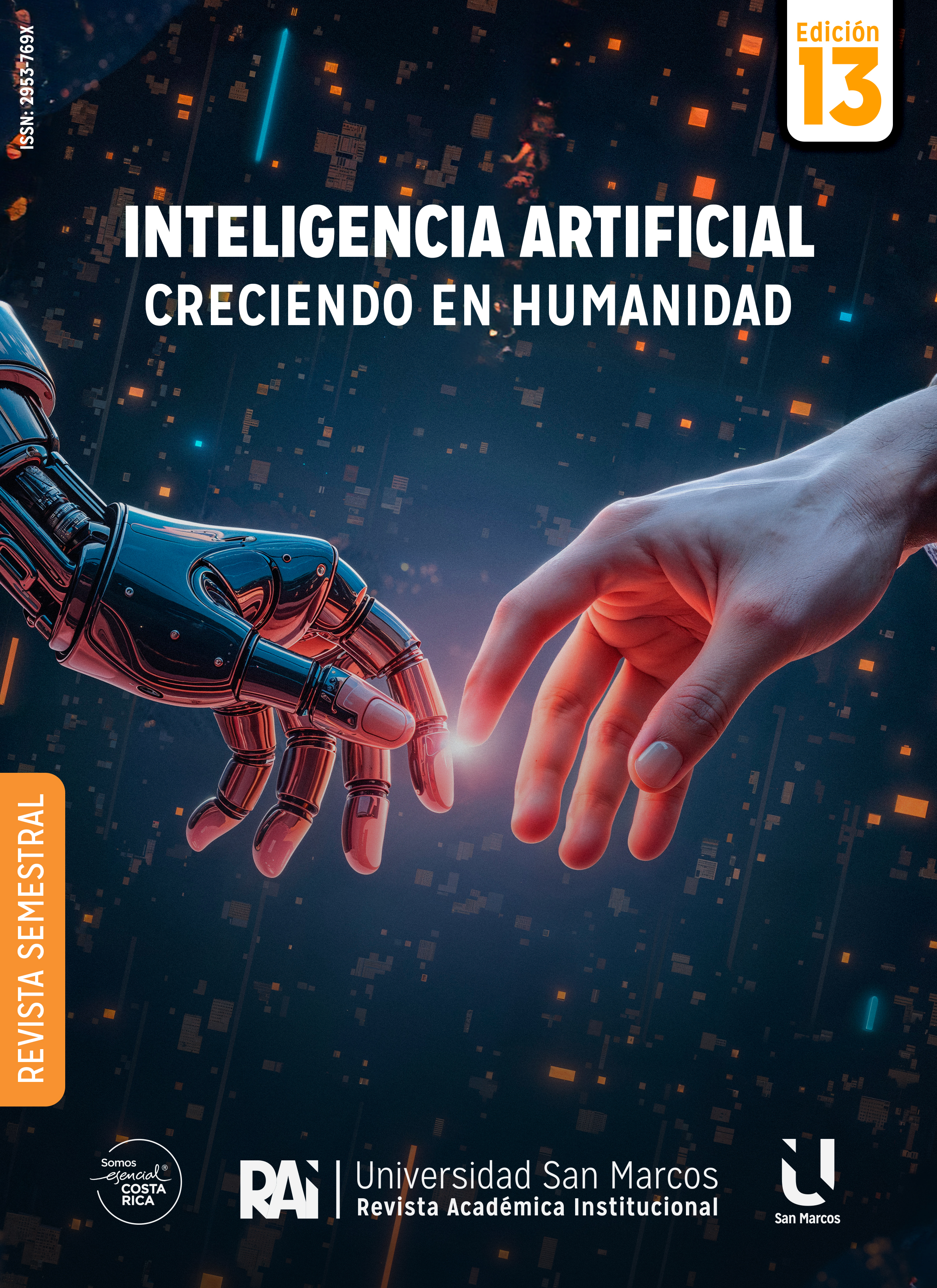On artificial intelligence, its applications in psychology and ethical considerations
DOI:
https://doi.org/10.64183/2ne9rz28Keywords:
Emotional intelligence, Ethics, Psychology, Mental healthAbstract
The integration of artificial intelligence (AI) into the fields of mental health, psychology, and ethical decision-making has generated both enthusiasm and concern. This systematic review, guided by the PRISMA 2020 guidelines, aims to identify and analyze emerging ethical challenges related to the use of AI in psychological, clinical, and academic contexts. A search of the Scopus database was conducted, retrieving 50 articles, of which 16 were selected based on previously defined inclusion and exclusion criteria. The findings reveal a wide range of ethical implications, including dehumanization, algorithmic biases, lack of explainability, and conflicts between technological efficiency and human values. This review concludes that, while AI offers significant opportunities, its application in psychology must be supported by robust regulatory frameworks that ensure ethical, participatory, and responsible practices
Downloads
References
Agarwal, A. (2025). Optimizing employee roles in the era of generative AI: a multi-criteria decision- making analysis of co-creation dynamics. Cogent Social Sciences, 11(1). Scopus. https://doi.org/10.1080/23311886.2025.2476737
Almeida, G. F. C. F., Nunes, J. L., Engelmann, N., Wiegmann, A., & Araújo, M. D. (2024). Exploring the psychology of LLMs’ moral and legal reasoning. Artificial Intelligence, 333. Scopus. https://doi.org/10.1016/j.artint.2024.104145
Aydınlar, A., Mavi, A., Kütükçü, E., Kırımlı, E. E., Alış, D., Akın, A., & Altıntaş, L. (2024). Awareness and level of digital literacy among students receiving health-based education. BMC Medical Education, 24(1). Scopus. https://doi.org/10.1186/s12909- 024-05025-w
Benzinger, L., Epping, J., Ursin, F., & Salloch, S. (2024). Artificial Intelligence to support ethical decision-making for incapacitated patients: A survey among German anesthesiologists and internists. BMC Medical Ethics, 25(1). Scopus. https://doi.org/10.1186/s12910-024-01079-z
Chiofalo, M. L. M., Giudici, C., & Gardner, H. (2022). An interview with Howard Gardner: John H. and Elisabeth A. Hobbs research professor of cognition and education at the Harvard Graduate School of Education. Eurasia Journal of Mathematics, Science and Technology Education, 18(6). Scopus. https://doi.org/10.29333/ejmste/12035
Cortina, A. (2019). Ética de la inteligencia artificial. Revista Iberoamericana de Bioética, (10), 1-13.
Dávila Morán, R., & Agüero Corzo, E. (2023). Desafíos éticos de la inteligencia artificial: implicaciones para la sociedad y la economía. Conrado, 19(94), 137-144. http://scielo.sld.cu/scielo.php?script=sci_arttext&pid=S1990-86442023000500137&lng=es&tlng=es.
Dolunay, A., & Temel, A. C. (2024). The relationship between personal and professional goals and emotional state in academia: A study on unethical use of artificial intelligence. Frontiers in Psychology, 15. Scopus. https://doi.org/10.3389/fpsyg.2024.1363174
Farmer, R. L., Lockwood, A. B., Goforth, A., & Thomas, C. (2024). Artificial Intelligence in Practice: Opportunities, Challenges, and Ethical Considerations. Professional Psychology: Research and Practice, 56(1), 19-32. Scopus. https://doi.org/10.1037/pro0000595
Fazelpour, S., & De-Arteaga, M. (2022). Diversity in sociotechnical machine learning systems. Big Data and Society, 9(1). Scopus. https://doi.org/10.1177/20539517221082027
Hesjedal, M. B., Lysø, E. H., Solbjør, M., & Skolbekken, J.-A. (2024). Valuing good health care: How medical doctors, scientists and patients relate ethical challenges with artificial intelligence decision-making support tools in prostate cancer diagnostics to good health care. Sociology of Health and Illness, 46(8), 1808-1827. Scopus. https://doi.org/10.1111/1467-9566.13818
INFOCOP. (2025). Beneficios y riesgos de la IA en la atención a la salud mental, según MHE. Madrid, España.: https://www.infocop.es/. https://www.infocop.es/beneficios-y-riesgos-de-la-ia-en-la-atencion-a-la-salud-mental-segun-mhe/
Kostick-Quenet, K., Lang, B. H., Smith, J., Hurley, M., & Blumenthal-Barby, J. (2024). Trust criteria for artificial intelligence in health: Normative and epistemic considerations. Journal of Medical Ethics, 50(8), 544-551. Scopus. https://doi.org/10.1136/jme-2023-109338
Kuhail, M., Alturki, N., Thomas, J., Alkhalifa, A., & Alshardan, A. (2024). Terapia humano- humano versus humano-IA: un estudio empírico. Revista internacional de interacción persona- computadora., 1-12. doi: https://doi.org/10.1080/10447318.2024.2385001
Norton, L. W., Howell, A. W., DiGirolamo, J. A., & Hayes, T. L. (2024). USING ARTIFICIAL INTELLIGENCE IN CONSULTING PSYCHOLOGY. Consulting Psychology Journal, 76(2), 137-162. Scopus. https://doi.org/10.1037/cpb0000274
Ooi, P., & Wilkinson, G. (2024). Mejora de los códigos éticos mediante la gobernanza de la inteligencia artificial: una necesidad creciente para la adopción de la IA generativa en la orientación. British Journal of Guidance & Counselling, 1-15. doi: https://doi.org/10.1080/03069885.2024.2373 180
Poszler, F., & Lange, B. (2024). The impact of intelligent decision-support systems on humans’ ethical decision-making: A systematic literature review and an integrated framework. Technological Forecasting and Social Change, 204. Scopus. https://doi.org/10.1016/j.techfore.2024.123403
Salvatori, S. (2025). Los principales problemas del uso de la IA en la Psicología. Psicología para todos PPT, 1-10. https://www.psicologiaparatodos.net/cerebro/los-principales-problemas-del-uso-de-la-ia-en-la-psicologia/
Scarpazza, C., & Zangrossi, A. (2025). Artificial intelligence in insanity evaluation. Potential opportunities and current challenges. International Journal of Law and Psychiatry, 100. Scopus. https://doi.org/10.1016/j.ijlp.2025.102082
Sedlakova, J., & Traschel, M. (2022). Conversational Artificial Intelligence in Psychotherapy: A New Therapeutic Tool or Agent? The American Journal of Bioethics, 23(5) 4-13. doi:https://doi.org/10.1080/15265161.2022.2048739
Skorburg, J. A., O’Doherty, K., & Friesen, P. (2024). Persons or Data Points? Ethics, Artificial Intelligence, and the Participatory Turn in Mental Health Research. American Psychologist, 79(1), 137-149. Scopus. https://doi.org/10.1037/amp0001168
Vorecol. (2024). ¿Cuáles son las principales barreras culturales para la adopción de la inteligencia artificial en las empresas hoy en día? México D.F.: Equipo de edición de Vorecol. https://vorecol.com/es/articulos/articulo-cuales-son-las-principales-barreras-culturales-para-la-adopcion-de-la-inteligencia-artificial-en-las-empresas-hoy-en-dia-117017
Yuan, S., Li, F., Browning, M. H. E. M., Bardhan, M., Zhang, K., McAnirlin, O., Patwary, M. M., & Reuben, A. (2024). Leveraging and exercising caution with ChatGPT and other generative artificial intelligence tools in environmental psychology research. Frontiers in Psychology, 15. Scopus. https://doi.org/10.3389/fpsyg.2024.1295275
Downloads
Published
Issue
Section
License
Copyright (c) 2025 Revista Académica Institucional

This work is licensed under a Creative Commons Attribution-NonCommercial-NoDerivatives 4.0 International License.










